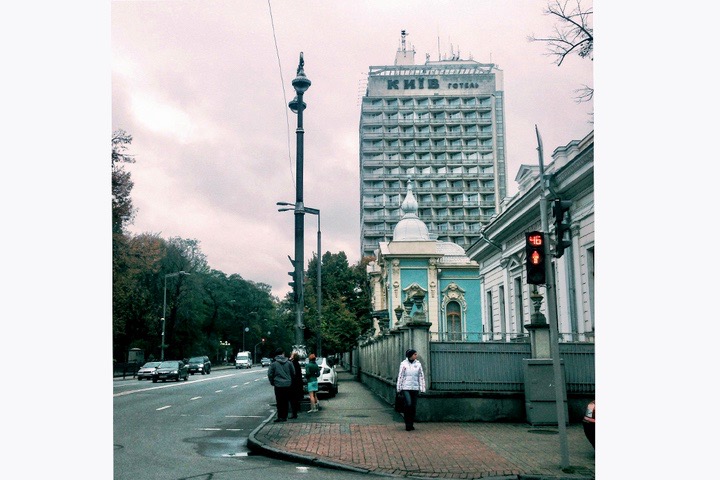The first encounter of our project “Beyond the Protocol – Women and International Politics in Germany and Ukraine” in cooperation with the Ukrainian Think Tank International Centre for Policy Studies has come to an end. Time to take stock of an enlightening week in Kyiv.
A Report by Sonja Schiffers and Vera Lamprecht
At this year’s World Economic Forum, Canadian Prime Minister Justin Trudeau warned that “we shouldn’t be afraid of the word feminist”. Later, US President Barack Obama published an article titled This is What a Feminist Looks Like. And in his opening statement of the 71st UN General Assembly, Secretary General Ban-Ki Moon joined their ranks by declaring he was proud to “call [him]self a feminist”. These statements suggest that we are already now in the midst of a feminist turn – in domestic as well as in global affairs.
The Absence of Women in Domestic and International Affairs
Yet, the absence of women in high-level political positions in the domestic and international realm, and most notably in international peace and security remains striking: In 2015, only 11 percent of Ukrainian parliamentarians were women. Despite a remarkable 47 percent overall share of women within the German Foreign Office, they only filled 25.7 percent of the leadership positions in 2014. UN Women revealed that within 31 major peace processes between 1992 and 2011, only 4 percent of signatories, 2.4 percent of chief mediators, 3.7 percent of witnesses and 9 percent of negotiators were women.
Our Response: Engage Women “Beyond the Protocol” – Part I in Kyiv
This is why we – three young women from Germany and Ukraine – decided to organize the first German-Ukrainian encounter “Beyond the Protocol: Women and International Politics in Ukraine and Germany.” After months of meticulous bilateral brainstorming, planning and organizing we were excited to welcome a group of 18 German and Ukrainian highly motivated participants for our first week-long conference which started on October 9th, 2016 in Kyiv.
Together with them and our speakers, coming from a wide array of professional and personal backgrounds, we wanted to tackle old paradigms and to question who actually designs and implements our foreign policy, thus managing our inter-state relations in times of peace and conflict. Whose peace and security are we discussing? Whose experiences and issues are part of the game, and whose are left out?
Far from suggesting that definite answers to these complex questions can be found within a few days, we are glad to share with you some selected insights from our expert discussions.
Gender Equality in Ukraine
Domestic politics are key to international dimensions of gender issues. That is why domestic gender debates were key to our expert discussions. And even though our speakers covered different aspects of the debates, all of them agreed on one point: Ukraine has made big achievements in terms of gender equality but still has a long way to go.
Svitlana Voitsekhovska, MP and representative of the Interfactional Union “Equal Opportunities” of the Ukrainian Parliament, raised a crucial point when she lamented Ukraine’s lack of a “gender-aware education free from stereotypes, beginning in kindergarten and ending with higher education”. Gender activists and journalists Iryna Slavinska and Olha Vesnianka harshly criticized the high level of sexism in Ukrainian politics and media. As a young woman involved in these areas, Slavinska told from her own experience, “it is very hard to make a career in our system of patriarchy”.
Still, Slavinska – just like all of our speakers and participants – impressively illustrates how women succeed despite the manifold obstacles they face. Hanna Hopko, our patron and Head of the Parliamentary Committee on Foreign Affairs shared interesting insights from the Parliament: “There are only 12 percent of women in parliament, but men are already afraid of what will happen when women are equally represented”. Several female MPs noted that male MPs call them “drills” or “tractors” as they are highly motivated and more active than men, which was also stressed by our most outspoken feminist expert Maria Dmytrieva.
Women, Peace and Security
Out of all European countries, issues related to women, peace and security are most pressing in Ukraine these days; a protracted conflict in the East of the country continues to kill and injure soldiers and civilians. All our experts pointed out that women – be they civilians, soldiers, internally displaced persons (IDPs), victims of landmines or sexual violence – are disproportionally affected by the on-going conflict.
Olga Aivazovska, representative of Ukraine in the political sub-group of the Minsk Trilateral Contact Group on the peaceful settlement of the conflict in the Donbass region, criticized that women’s organizations were “often not mainstreaming their demands and proposals” but presenting them as separate from other aspects of the conflict. MP Iryna Lutsenko from the Interfactional Union “Equal Opportunities” highlighted that female IDPs “lost everything, but not their thirst for life. These women are very active; they just need more opportunities. Including them in the political process will have great results”. Another important issue that was addressed by several experts is the involvement of men in issues of women, peace and security: “When men talk to men it has a different impact than when women talk to men about gender issues”, argued UN Women gender advisor Tamar Tavarkiladze. MP Maria Ionova echoed this claim: “Men have to be advocates of gender questions”.
Women in International Politics and Diplomacy
During a meeting at the Diplomatic Academy of Ukraine we had the opportunity to discuss the involvement of women in international politics with female Ukrainian diplomats. This debate revealed how much perceptions differ when it comes to assessing whether women, who are still strongly underrepresented within the Ukrainian Foreign Office, do actually enjoy equal opportunities. One young female diplomat stated that “women do not want to compete with men” since they “do not need prestigious work as a minister or ambassador”, claiming that she never faced any obstacles related to her gender, whereas other discussants warned that we should “kill our inherent self-discrimination and self-sexism”.
A discussion also evolved around whether the fact that women are more often appointed to administrative (e.g. writing protocols) rather than to political positions is discrimination or related to missing competencies. And although the argument was made repeatedly that a woman who wants to succeed in diplomacy needs “to sacrifice [her] private life in some way”, Olena Zakharova, ICPS Analytics and External Relations Officer and our Ukrainian Project Manager vehemently argued that it must be possible for women to combine professional and private life.
Beyond “Beyond the Protocol”: Blog Series and Part II in Berlin
After an intense week full of interesting discussions and encounters, we are ever more motivated to generate new ideas, energy and awareness, and thereby contribute to shaping the future of gender-responsive foreign policy as well as conflict resolution processes in our respective countries. This is only the beginning of engaging women “Beyond the Protocol”. The second part of our workshop will continue in Berlin on November 20th – 25th.
Until then, we keep you posted so you get to know our project and our participants through their blog posts during the next weeks. And most importantly: Save the date for our public final event on November 24th, 2016 at 7pm and join us for an inspiring debate with Elke Ferner, Parliamentary State Secretary at the Federal Ministry of Family Affairs, Senior Citizens, Women and Youth, Sylke Tempel, Chairwoman of Women in International Security Germany and Editor of the journal “International Politics” at the German Council on Foreign Relations and Andreas von Beckerath, Ministry of Foreign Affairs of Sweden and Former Swedish Ambassador to Ukraine.
The project “Beyond the Protocol – Women and International Politics in Germany and Ukraine” is funded mainly by the German Foreign Office and the Robert Bosch Foundation, under the umbrella of the Meet Up! – German-Ukrainian dialogue program of the Foundation “Remembrance, Responsibility and Future”, as well as financially supported by the Alfred-Herrhausen-Gesellschaft and the German-Ukrainian Forum.
The Polis Blog serves as a platform at the disposal of Polis180’s members. Published comments express solely the authors’ opinions and shall not be confounded with the opinions of the editors or of Polis180. Image: Sonja Schiffers.

Sonja Schiffers
Sonja Schiffers is a PhD candidate at the Berlin Graduate School for Transnational Studies, writing her dissertation on global challenges to civil liberties and Russian and Turkish foreign policy. She holds an M.A. in International Relations (Berlin/Potsdam) and a B.A. in European Studies (Maastricht University). Together with Vera Lamprecht, Sonja has been managing the project „Beyond the Protocol – Women and International Politics in Germany and Ukraine“ since January 2016. She previously gained work experience at the Moscow State Institute for International Relations (MGIMO), Heinrich Böll Foundation in Tbilisi, Representation of the European Commission in Berlin as well as at the German Consulate General in San Francisco.

Vera Lamprecht
Vera Lamprecht is currently finishing her M.A. in International Security and Political Sciences (double degree Sciences Po Paris / Freie Universität Berlin). She completed her B.A. at the European Campus of Sciences Po Paris in Nancy. Together with Sonja Schiffers, Vera has been managing the project „Beyond the Protocol – Women and International Politics in Germany and Ukraine“ since January 2016. She gained work experience at the German Mission to the United Nations in New York, as an intern at the Peace and Research Institute Frankfurt (PRIF) and as a student trainee at the Munich Security Conference. She also spent a year in St. Petersburg and Kaliningrad.
